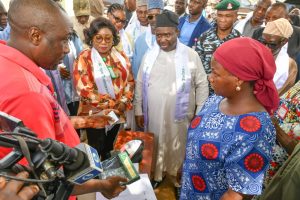Abuja, Nigeria — A leading Nigerian human rights organisation has called on the Federal Government to declare a state of emergency for girl-child education and protection, demanding immediate implementation of policies to address the plight of millions affected by conflict, genital mutilation, and educational exclusion.
The call was made by the Grassroots Center for Rights & Civic Orientation (GRACO) on Saturday, October 11, to mark the International Day of the Girl Child, which carried the theme: ‘The Girl I Am, The Change I Lead: Girls on the Frontlines of Crisis.’ The urgency of the crisis was underscored by Armsfree Ajanaku, GRACO’s Executive Director, in the statement. He noted that despite their immense potential, Nigerian girls bear a disproportionate burden of the nation’s instability.
Shocking Statistics on Education and Violence
Mr. Ajanaku cited alarming statistics highlighting the scale of the challenge. According to figures from the UN Children’s Fund (UNICEF), over 7.6 million girls are currently out of school in Nigeria—a gender gap that represents more than half of all girls missing out on basic education.
This exclusion is compounded by a high incidence of violence:
- Gender-Based Violence (GBV): One in three Nigerian women has experienced physical violence by the age of 15, often rooted in early and forced marriages that curtail their rights.
- Female Genital Mutilation (FGM): Nigeria accounts for over 20 million cases of FGM, a harmful practice that inflicts irreversible physical and psychological harm on girls.
GRACO stressed that these issues are further worsened by insurgency, banditry, and economic volatility, urging stakeholders to recognise girls not merely as victims but as potential “architects of transformation.”
The Path to Policy Implementation
While acknowledging the expressed commitment of the Federal Ministry of Women Affairs and local efforts to eradicate FGM, GRACO insists that bold, urgent reforms are required to translate promises into impact.
The organisation put forth specific policy demands to the Federal, State, and Local Governments:
- Full Implementation of the Universal Basic Education Act: Ensuring free, compulsory, and quality education for all girls, supported by targeted scholarships and safe transport, especially in conflict-affected and rural areas. GRACO urged authorities to dismantle “cumbersome barriers” like hidden fees that lead to over a million girls dropping out annually.
- Strengthening Legal Frameworks: Enacting and enforcing laws against GBV, child marriage, and FGM. This includes setting up dedicated gender desks in law enforcement institutions and establishing nationwide hotlines to provide immediate psychosocial aid to survivors, modelled on successful systems in states like Lagos and Kaduna.
- Girls as Leaders: Integrating girl-led initiatives into national policies, such as involving girls from flood-prone regions like Benue and Bayelsa to co-design climate resilience strategies.
GRACO concluded by reaffirming its commitment to amplifying the voices of Nigerian girls, stating that their empowerment is the collective responsibility of the entire country.





Add Comment